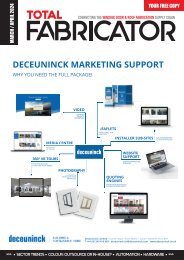Feb/March 2020
You also want an ePaper? Increase the reach of your titles
YUMPU automatically turns print PDFs into web optimized ePapers that Google loves.
Poor Payment
HOW TO TACKLE LATE PAYMENT
By Todd Davison, MD, Purbeck Insurance Services.
Late payment remains a curse for smaller
businesses, so when a new private members
bill was launched in the House of Lords in
January with proposals for a statutory limit of
30 days for paying bills and for unfair payment
practices to be outlawed, the move received
widespread support.
As a provider of personal guarantee insurance
for the owners and directors of small businesses
across the UK who have taken out a personal
guarantee backed business loan, the biggest
portion of our customers are working in property
and construction. The team at Purbeck is
therefore on the front line when it comes to
understanding the financial stress SMEs face
when firms higher up the chain won’t pay what
they owe on time.
We regularly speak to owners and directors who
have taken the serious step of securing new
finance to plug the gaps in cashflow created by
late payment, prompting the demand for personal
guarantee insurance.
Not surprisingly, when we surveyed the owners and
directors of small businesses in the construction
sector last year, over a third (35%) said the most
challenging and difficult aspect of running their
business was dealing with late payment.
The new late payment bill is good
news but it will take time for
it to pass into law. However,
there are steps businesses
can take to reduce the risk of
late payment and many of the
tactics below are designed to get
your invoice to the top of the pile.
• Use the Late Payment Act. This allows any
business paid late to claim interest for the period
the debt was overdue, plus compensation, if the
contract terms allow it. The entitlement to claim
interest and compensation remains for six years
on each and every invoice paid late.
• State the Terms and Conditions of payment
clearly including how you will deal with overdue
payments and the fact that the cost of any debt
recovery activity will be added to the invoice
• Tell customers early on, as part of good
relationships, that legal action will be taken
against non-payers.
• Send an invoice by email to your contact and
accounts payable at the same time – making
doubly sure your invoice has been received.
• Add up the costs of going legal early (interest,
late payment compensation, indemnity costs
Left: Todd Davison.
under contract) and confirm
the figure to your customer.
Use an online late payment
calculator to help work this
out.
• Use a Late Payment Demand to
show the customer the costs they will
face, in addition to the debt, if they don’t pay up.
• A Letter Before Action (LBA) is the last resort
before taking a claim to court. It sends a strong
message to late payers and gives them one last
chance to settle their debt.
• Obtain fixed fee advice from a specialist
solicitor before sending an LBA if any issues or
disputes arise with your debtors.
• Consider using a Winding-Up demand for debts
over £750.
• Make a call before you issue a Claim to remind
them of the escalating costs that will result in
court proceedings.
• Tell your legal representatives to include your
contractual costs, compensation and interest if
you are entitled to them all.
• After the Claim is issued, ask the debtor if they
want to pay to avoid Judgment which will hit their
credit rating.
Without strong cash flow it is difficult for
small businesses to reinvest and grow, so
being tough and having a robust approach to
late payment could push your invoices higher
up the pile and save the time and stress of
chasing in the future.
Contact Purbeck
0208 004 7250
www.purbeckinsurance.co.uk
@PG_Insurance
14 T F FEB/MAR 2020 CONNECTING THE WINDOW, DOOR & ROOF FABRICATION SUPPLY CHAIN

















